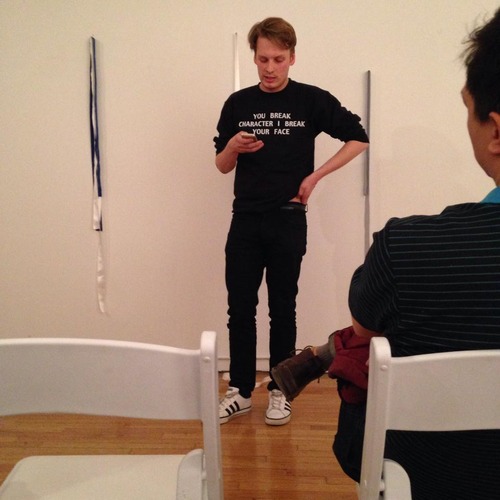
Kate Durbin and Andrew Durbin in Conversation
The following conversation is between Andrew Durbin and Kate Durbin, both writers and artists of precision and abundance who have each published books in the past year (Mature Themes (Nightboat) and E! Entertainment (Wonder), respectively). About the two writers, rumors abound. Some are clarified below. What can be said is that both writers excise contemporary phenomena, (the return of the tracksuit, selfies, Katy Perry, The Real Housewives of Beverly Hills) not simply by recasting each in a new capacity for feeling, but showing what’s been embedded inside the culture all along and why each phenomena is important.
As I type, Kate is headed to Art Basel Miami Beach to restage her performance Hello, Selfie, an investigation into global markets via the Hello Kitty brand, exoticism, and feminism. The piece throws harsh light on the vulnerability of existing as a woman with a body made public, subject to male sexual aggression. The performance is documented in selfies, which are posted for anyone to see online during the performance.
Below Andrew tells us “I’ve been playing around with the idea of writing an erotic novella about fisting called Feelings Fade,” and I wish he would, perhaps dedicated to me. He is, however, writing a novel called Blonde Summer (which—to my knowledge—takes its title from the caption of an image on artist Juliana Huxtable’s Instagram). Durbin’s first book Believers, a limited boutique edition released by Poor Claudia out of Portland, drew attention from critics such as Bruce Hainley, Chris Kraus, and curator Lauren Cornell, who invited him to launch Mature Themes at the New Museum, which he did just this Fall.
What follows is a candyland of delights, starting immediately by confirming your suspicion: yes, they are married.
—Ben Fama
I. SPEAKING OF THE UNSPEAKABLE
ANDREW DURBIN: I grew up very embarrassed by our last name—and I always wanted to change it. It’s always sounded very old to me. Growing up in the South, I felt it signaled to people that I wasn’t “from there,” even though I was. Do you like our name?
KATE DURBIN: Sometimes I wish I had created a new name for myself, like Marilyn Monroe, before I started putting work in the world. But I also like the blank canvas of Durbin—it doesn’t really mean anything, so I can dress up as I like depending on whatever I’m working on.
When people ask you if I am your wife or sister, what do you say?
AD: I like the idea of creating a new identity. I’ve always fantasized about publishing some work under a pseudonym. As for us, I usually dodge the question...
You have reached your article limit
Sign up for a digital subscription and continue reading all new issues, plus our entire archives, for just $1.50/month.
Already a subscriber? Sign in




